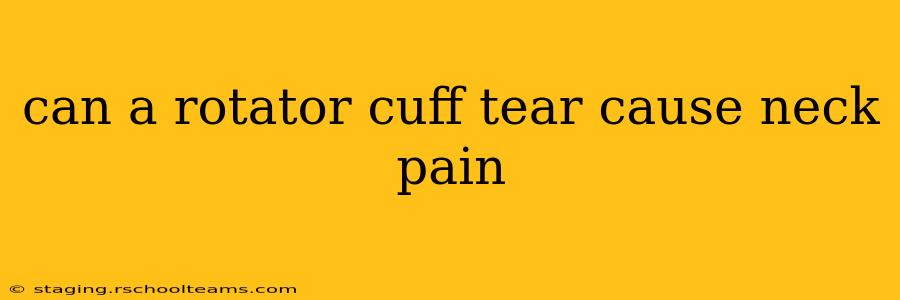A rotator cuff tear, while primarily affecting the shoulder, can indeed sometimes cause referred pain in the neck. This isn't a direct cause-and-effect relationship in all cases, but the complex interplay of muscles, nerves, and the overall biomechanics of the upper body can lead to this seemingly unrelated symptom. Let's explore why this might happen and what you should do if you're experiencing both neck and shoulder pain.
How Can a Rotator Cuff Tear Lead to Neck Pain?
The connection between a rotator cuff tear and neck pain stems from several factors:
-
Muscle Compensation: When the rotator cuff is damaged, the body compensates by overworking other muscles to stabilize the shoulder. These muscles, including those in the neck and upper back, can become strained and tense, resulting in pain. This is especially true for muscles like the trapezius and levator scapulae, which connect the neck and shoulder blades.
-
Nerve Irritation: The nerves supplying the shoulder and neck are intertwined. Inflammation from a rotator cuff tear can irritate these nerves, leading to pain radiating into the neck. This referred pain can be difficult to pinpoint, making it seem like the neck is the primary source of the problem.
-
Postural Changes: Pain from a rotator cuff injury often leads to changes in posture. Individuals might hunch or slouch to protect the injured shoulder, placing extra strain on the neck and upper back muscles, ultimately contributing to neck pain.
-
Spinal Instability: In some cases, a severe rotator cuff tear or long-term shoulder dysfunction can indirectly contribute to instability in the cervical spine (neck). This isn't a direct causal link, but rather a secondary effect stemming from altered body mechanics and compensatory movements.
What Are the Symptoms of a Rotator Cuff Tear?
It's important to distinguish between pain originating directly from the neck versus pain referred from the shoulder. Symptoms of a rotator cuff tear often include:
- Shoulder pain: This is the primary symptom, often worse at night or with certain movements.
- Weakness: Difficulty lifting or rotating the arm.
- Limited range of motion: Inability to fully raise or rotate the arm.
- Clicking or popping sound: Heard in the shoulder joint during movement.
- Swelling: Although not always present.
Neck pain associated with a rotator cuff tear might feel like:
- A dull ache: In the neck and upper back.
- Stiffness: Making it difficult to turn your head or move your neck.
- Muscle tightness: Especially in the upper trapezius muscles.
What if I Have Neck Pain and Suspect a Rotator Cuff Tear?
If you're experiencing both neck pain and shoulder pain, it's crucial to seek a medical professional's assessment. Self-diagnosing can be misleading, and delayed treatment for a rotator cuff tear can lead to further complications. A doctor or physical therapist can accurately diagnose the problem through a physical examination, imaging tests (like MRI or X-ray), and range-of-motion assessments.
How is a Rotator Cuff Tear Treated?
Treatment options for a rotator cuff tear vary depending on the severity of the tear and the individual's overall health. They can range from conservative measures like rest, ice, physical therapy, and pain medication to surgical repair in more severe cases.
Does a Rotator Cuff Tear Always Cause Neck Pain?
No, a rotator cuff tear does not always cause neck pain. Many individuals experience shoulder pain exclusively. However, the possibility of referred pain to the neck should be considered, particularly if the pain is accompanied by other symptoms like shoulder weakness, limited range of motion, or postural changes.
Can Neck Problems Cause Shoulder Pain?
Yes, absolutely. Neck problems, such as cervical spondylosis, pinched nerves, or muscle strains, can also cause referred pain in the shoulder, mimicking symptoms of a rotator cuff tear. This highlights the importance of comprehensive medical evaluation to accurately pinpoint the source of your pain.
In conclusion, while not always the case, neck pain can be a symptom associated with a rotator cuff tear due to complex musculoskeletal and neurological connections. Always consult a healthcare professional for proper diagnosis and treatment if experiencing pain in your neck and shoulder. Accurate diagnosis is crucial for effective treatment and recovery.
